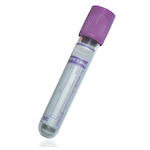Cyclosporin (Ciclosporine)
Specimen Volume
1 mL whole blood (minimum sample volume 600 uL)Sample Preparation
Turnaround Time
24 hoursSample Processing In Laboratory
In-patient samples received in the lab before 12:00 will be analysed and reported on the same day, whilst samples arriving after 12:00 are reported the next working day. For urgent samples received after 12:00 please phone the laboratory on ext 15980.Sample Stability
Samples can be stored at room temperature if to be assayed within eight hours, or up to one week at 4 ºC.General Information
Cyclosporin is a potent immunosuppressive drug effective in combating tissue rejection following organ transplantation. However, therapeutic doses in humans can cause a number of adverse side effects including renal and hepatic dysfunction, hypertension, neurotoxicity, lymphoma, abnormal glucose homeostasis, hypertrichosis and gingival hypertrophy.
The efficacy and degree of toxicity of cyclosporin is highly variable between individuals. However, intra- and inter- individual variablility in cyclosporin absorption, distribution and clearance is so great that standard dosing protocols based on median population values are considered inappropriate and monitoring of cyclosporin levels is required.
Dosages must be individualised to maintain Ciclosporin levels within the narrow therapeutic window that exists between inadequate immunosuppression from low doses, and toxic effects resulting from over administration.
Patient Preparation
Trough samples should be taken in all instances except for C2 cyclosporine, where samples are taken 2 hours post dose.
Reference Range
Reference or therapeutic ranges are not reported as therapeutic target ranges are applied on an individual basis dependent upon specialty, dosing, period in treatment regime and clinical status. Further advice can be obtained from the appropriate speciality.
Specifications
- EQA Status: NEQAS
- EQAS Scheme: Yes








